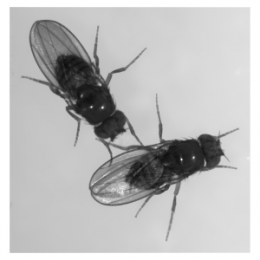Fruit flies are LinkedIn: Genes may determine social skills that could shed light on human behaviour

(Phys.org) -- The fruit flies hovering around your kitchen compost bin have an active social life. As they eat, court and fight, the flies change their behavior depending on who they hang out with—just as humans do.
Now, for the first time, U of T Mississauga researchers have shown that when the flies meet, they form structured social networks. Because humans often have the same genes that underlie fruit fly behavior, the research could ultimately help biomedical researchers understand human diseases such as autism and schizophrenia, says Joel Levine, a biology professor and Canada Research Chair in Neurogenetics.
"We wanted to know whether flies interact in a way that's just an accident based on bumping into each other or if they interact differently when they get some kind of social feedback about their surroundings," says graduate student Jonathan Schneider, lead author of the study published in the Proceedings of the National Academy of Sciences (early edition, July 16, 2012). "Picture a dinner-party mixer where you are walking around and shaking hands with other attendees," he suggests. “Are those interactions random, or are you naturally attracted to some party-goers more than others?”
Schneider and his team plucked groups of 12 fruit flies at random from a lab population and videotaped them for 30 minutes. They ran the videos through a computer program that recorded the identity of each fly and whether it approached or preened in front of other flies. Then Schneider compared the social networks developed during the experiments to a randomly generated network. He found that the flies formed distinct social networks, complete with “popular” flies that were preferentially sought out by the other group members.
When the scientists ran the experiments with two genetically different strains of flies, they measured unique differences in the social networks formed by the two strains, suggesting that genes influence the network-forming behavior. And flies with an impaired sense of taste and smell showed an extreme reduction in the ability to form networks, hinting that flies rely on these senses to form networks, Levine says.
“Social behavior is important to all animal species, including humans, so it makes sense that social life has a genetic basis,” Levine explains. If his team can map the genes involved, scientists will be able to use flies to investigate the role of groups in decision-making and sharing information and even probe the genetic basis of human mental diseases.
Journal information: Proceedings of the National Academy of Sciences
Provided by University of Toronto Mississauga















